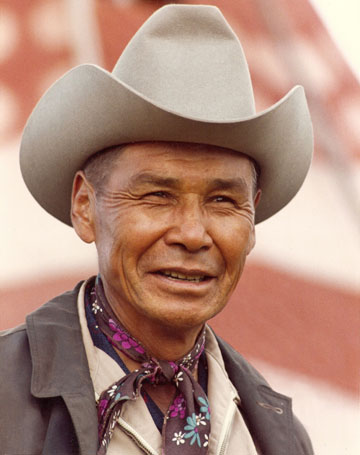Morley elder was mentor in language, joy of journey
COFFEE WITH WARREN, with Warren Harbeck
Cochrane Eagle, January 23, 2008

Morley elder Lazarus Wesley, shown here in the early 1970s at the Calgary Stampede Indian Village, died Jan. 15 at the age of 91. Photo by Warren Harbeck
I called him mîchîn (meen-CHEEN), “my older brother” in his language. He never ceased to amaze me with his earthy wisdom, traditional skills and linguistic competence.
Lazarus Wesley, hunter/trapper, rancher, rodeo rider, cross-cultural communicator, goodwill ambassador, politician, preacher and revered elder of the Stoney Nakoda First Nation at Morley, passed away quietly at home on Jan. 15. He was 91.
Lazarus and his wife, Lily, were among the first to welcome my wife, Mary Anna, and me to Morley in 1965. We were there as consultants in writing-system development and Bible translation, something Lazarus was deeply committed to. He soon took me under his care, mentored me in the ways of his community, and became a principal translator of the Gospel of Mark into his language, published in audio tape format in the early 1970s.
Our work in those early years involved long trips together for workshops at a translation centre in New Mexico. On those trips, by word and example, Lazarus taught me many valuable lessons that have shaped who I am as a communicator and human being.
In tribute to mîchîn, I’d like to share with you four of those lessons.
The first major lesson he tried for years to teach me was the worthiness of oral tradition. I had grown up in a culture of books and the printed word as the only dependable way to communicate matters of great importance. Lazarus, although proficient in both an older Cree syllabic way and the modern alphabetic way of writing his language, was always cautious about putting Stoney into written form.
He had grown up in an oral tradition of careful listening, patient reflection, and engaging story-telling before live audiences. Indeed, his reputation as an orator is legendary. For Lazarus, oral tradition involved discipline, discernment in choice of words – often in discussion with others in the community over long periods of time – and appropriateness to given situations.
For example, although he had worked on the written manuscripts for Bible translation, he never used them in his preaching. I asked him why. He said that writing is too frozen; words appropriate to one audience might not be helpful to another. He much preferred to give live, well-considered oral interpretations of passages, so that he could adjust his delivery to the backgrounds and abilities of his listeners.
The second lesson is closely related to the first: the power of memory. I had become aware of Lazarus’ ability to remember accurately lengthy speeches and conversations without ever taking a note. I asked him about this, too. He was surprised I didn’t know. He said it was about using the ears, eyes and mind as a motion picture camera. While someone is speaking – even for an hour or more – you simply create a motion picture in your mind. And later, when you need to recall what was said, you replay that motion picture to yourself.
The third lesson is to take advantage of teachable moments. While we were in New Mexico once, we visited Bandalier National Monument, an ancient Pueblo cliff dweller community. Lazarus took the opportunity to teach me about Stoney legends of mâkotibin (mahng-KO-tee-BEEDN), the little people who dwell in the earth.
The fourth lesson is always to enjoy where you are and what you’re doing, even in the midst of work. For Lazarus and Lily, this included fascination with local customs, natural phenomena, and arts and crafts. Checking out Pueblo jewelry while at a translation workshop near Santa Fe was as much part of the joy of the journey as discussing complex language-related issues.
The years went by, and Lazarus became more and more a home body. Lily passed away last fall (see my column of Oct. 24, 2007).
Their 66th anniversary would have been January 15. When Lazarus didn’t wake up that morning, the family knew he just wanted to be by Lily’s side once more.
There’s been a long tradition among the Stoney Nakoda people that, when a home meeting or other wonderful community gathering comes to a close, we send each other on our way with a prayer of blessing that dates back generations. Loosely translated, it calls on the merciful love of God to be present with each of us, both now and forever more.
So, now that our time with Lazarus has come to a close, we bless him with that same blessing:
Owîchagiye ze, Tawawîchaye ze,
Jesus Christ wîchabârâsî ze,
Tachâga Wakâ, wahogû wîchakiye ze,
Warhî-îchine ze Nâri îgichiyabi chiyen,
Nâgahâ îs, nâgu echeyahneya echeyath.
Amen.
© 2008 Warren Harbeck
JoinMe@coffeewithwarren.com